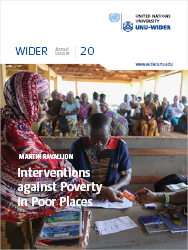WIDER Annual Lecture 20
Interventions against poverty in poor places
In 2016 WIDER Annual Lecture 20 was given by Professor Martin Ravallion. He discussed the economic and political issues surrounding the use of direct interventions, such as cash transfers and in kind contributions, against poverty. There is much hope for these interventions, but also much frustration; their performance in reality has often fallen short of policy makers’ expectations.
It is clear that economic growth has played a very important role in the progress that we have seen against absolute poverty in the world. By contrast, governmental interventions aimed directly at reducing poverty appear to have had at most a minor role in poor countries – although such policies appear to become more important as an economy develops and they have become very important in most rich countries.
The fact that pro-poor economic growth has done the bulk of the ‘heavy-lifting’ against poverty does not, however, mean that there is little scope for interventions in poor places. It may only mean that such interventions were not tried, or were poorly designed, or ineffective for some other reason, which might well be corrected. Indeed, some developing countries (and provinces within countries) have demonstrated an ability to deliver reasonably effective interventions. The policies may not always have been as effective as advocates claimed, but it is clear that the new millennium has seen developing countries embrace a range of interventions that can legitimately claim some success.
In this context, the term ‘intervention’ refers to any direct governmental effort to either alter the distribution of market incomes to favour poor people or to make markets work better for them. There are essentially two types of such interventions against poverty. The first uses redistributive transfers in cash or kind, generally targeted to households who are deemed poor based on observable criteria. This policy can be rationalized as either ethically defensible redistribution or as an effort to compensate for the market failures that helped create poverty – to make the economy both more efficient and more equitable despite the market failures. The second type of policy tends to work more directly at the market and institutional failures, essentially by making the key factor markets (labour, credit, and land) work better from the perspective of poor people, and giving them better legal protection...
 Join the network
Join the network